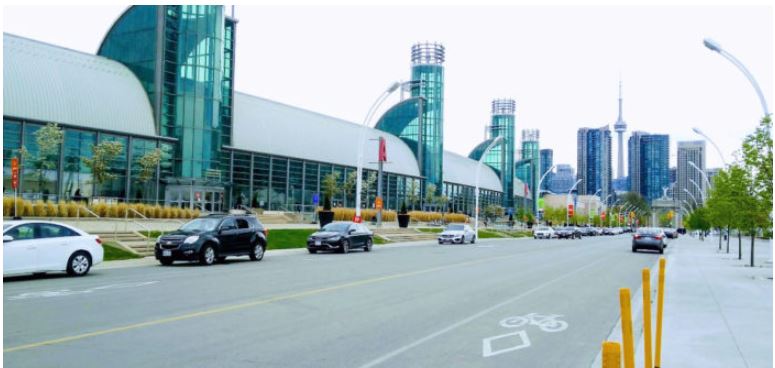
25. Jul 2019
XITASO at Collision 2019 in Toronto
Collision 2019, which is North Americas fastest growing Tech Conference, took place from May 20th to 23rd, 2019 in Toronto, Canada. Manuel Achúcarro, Software Developer at XITASO, attended and reports some of his impressions.
What is special about Collision when compared to other Tech Conferences?
Collision’s objective is to bring people and companies together in one location to define the global technological industry anew. This year, more than 25,000 visitors from 125 countries participated in order to deal with future oriented topics like Artificial Intelligence (AI) and Machine Learning, Internet of Things (IoT), 5G and IT-Security, through presentations, workshops or simply by networking. Among the speakers were numerous CEOs, Company founders or representatives from renowned Companies like Microsoft, Sony or Samsung, and also greats from the film, music and videogames world like Joseph Gordon-Levitt, Timbaland or Steve Aoki, for example.
The topic of AI is currently very popular and the application possibilities appear to be close to limitless. Were you able to learn anything new in this regard at the Conference?
AI, respectively Machine Learning and IoT were the top themes of the Conference. A lot of experts see this combination as future oriented and assume that therefore many sectors will undertake drastic changes. In the health sector for instance, portable devices and intelligent data processing, above all, will play an important role. Measuring instruments can be implemented for marketing and for customer response analysis, in order to determine points that evoke particularly visual awareness among customers. There is especially great potential in the deployment of Artificial Intelligence in the eductional sector. In this regard learning platforms have been developed which can customise the personal requirements of the individual students through AI and thereby help with the optimal learning experience. And of course intelligent projects are being honed in the industry in order to predict machine downtimes or quality problems with the help of intelligent data analysis and thereby to lead to more efficient production, for example. Similar predictive technologies are being used by banks and insurance companies to recognise possible market crashes or market upturns earlier through deploying realtime information from every sector. Some Software Developers even believe that AI technologies will be able to analyse the quality of software codes independently, in the future. In any case, it is a fact that very many people want to jump on board with AI and IoT and therefore the future has a lot in store in this regard.
In order to deploy the latest technologies in an AI and IoT environment, huge volumes of data must be collected. Did you come across solution proposals how this sort of challenge will be dealt with in the future?
As we live in an era where more data is collected, registered and analysed than we can process, this is precisely one of the greatest problems that was discussed at Collision. Because the major problem exists not only in the data volume, the transfer quotas or the signal propagation that can be covered by LTE-Technologies, but rather in the amount of devices that are actually capable of transferring the data simultaneously. One of the proposals for a solution for administration of such huge volumes of data that was offered at Collision, is the shifting of AI processing on Edge Devices to pre-processing and to autonomous decision making. Thereby, sub-units could be created which would process the data from lots of sensors and provide savings on reaction times and bandwidth. Another solution lies in the changeover to 5G, as LTE is no longer sufficient to cope with the high concentration of Smart Devices in intelligently networked cities and electricity grids, due to its limited spectrum of bandwidth.
Concerns are constantly being expressed when it comes to security of the new technologies. What are the experts saying on the topic of IT-Security?
Among the speakers at Collision there was general consensus that 5G will be more secure than LTE. Because with 5G damaging data volumes can be discovered at the network edge and blocked, so long as the device has no consciously integrated loopholes. Regarding security for the new IoT and AI era, the focus is on positioning IoT devices on the Cloud Edge. It was also announced at Collision that partnerships have been established which are working on giving Smart Devices the possibility to identify hacker attacks independently, to disconnect themselves, to report the problem and finally to download a new, cleaner version of their Software.
What were your personal highlights at Collision 2019?
The presentations and discussions on the future of automated personal air transportation and automated driving were particularly interesting. But it was also very exciting to learn more about the significance of 5G and VR for the gaming world or how technologies are being combined with concepts in the film industry to create attractive, realistic representations. And of course Toronto itself, a very rapidly changing city which is strongly oriented towards new technologies and was a very suitable, and indeed with its neo-classical architecture, a very beautiful setting.
Collision is a great Event, where you can get to know about new trends on the technologies market, to become inspired by new ideas and to come across investment possibilities.
Author & contact person
Do you have questions, ideas or feedback on this topic? Feel free to contact us!
The Spanish native graduated in electrical engineering and communications technology. Before Manuel Achúcarro joined XITASO in 2015, he was working as a Software Engineer.


